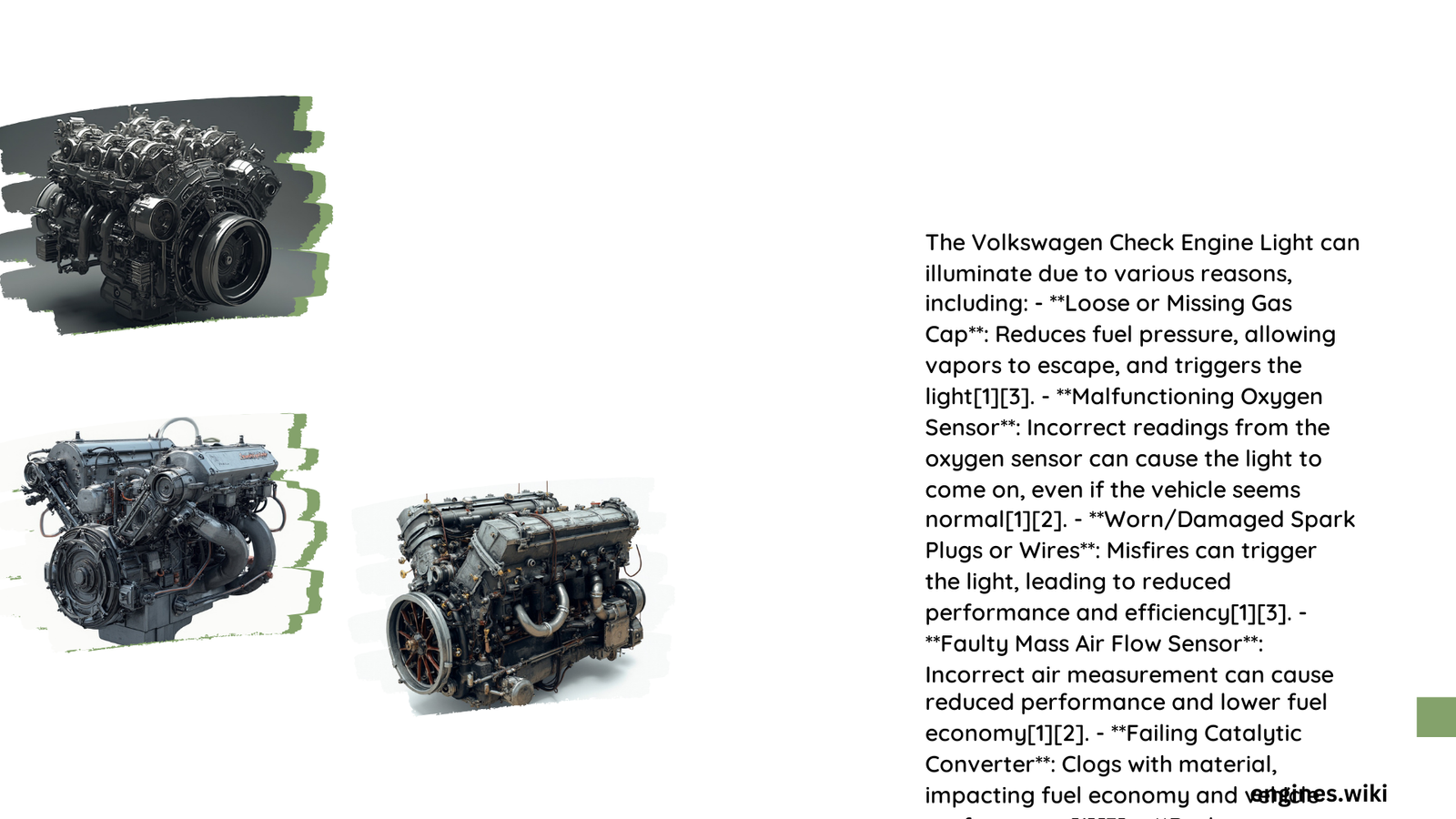Volkswagen check engine lights can be a source of anxiety for many car owners, signaling potential issues within your vehicle’s complex electronic systems. These warning indicators are part of the sophisticated On-Board Diagnostics II (OBD-II) system, designed to monitor your car’s performance and alert you to potential problems before they escalate into major mechanical failures. Understanding these signals is crucial for maintaining your Volkswagen’s health, performance, and longevity.
What Triggers a Check Engine Light in Volkswagen Vehicles?
Check engine lights in Volkswagen vehicles can be activated by a wide range of issues, from minor sensor malfunctions to significant mechanical problems. The complexity of modern automotive systems means that these warnings require careful diagnosis and interpretation.
Common Causes of Check Engine Lights
| Severity | Potential Causes | Typical Symptoms |
|---|---|---|
| Low | Loose Gas Cap | No performance issues |
| Medium | Oxygen Sensor Failure | Reduced Fuel Efficiency |
| High | Catalytic Converter Problems | Decreased Engine Performance |
How to Diagnose VW Check Engine Light Codes?
Essential Diagnostic Steps
- Obtain an OBD-II Scanner
- Professional-grade scanners provide more detailed information
-
Affordable consumer models work for basic diagnostics
-
Connect the Scanner
- Locate the OBD-II port (usually under the dashboard)
-
Plug in the scanner with the ignition in the “On” position
-
Read and Interpret Codes
- Note the specific error codes
- Cross-reference with Volkswagen diagnostic resources
Top 5 Most Frequent VW Check Engine Light Codes
- P0300: Random/Multiple Cylinder Misfire
- P0130: Oxygen Sensor Circuit Malfunction
- P0420: Catalytic Converter Efficiency Issue
- P0442: Small Evaporative Emission System Leak
- P0171: Fuel System Too Lean
What Are the Potential Repair Costs?

Repair costs for check engine light issues in Volkswagen vehicles can vary significantly:
- Minor Issues ($50-$200)
- Sensor replacements
- Gas cap tightening
-
Simple electrical repairs
-
Moderate Repairs ($200-$600)
- Oxygen sensor replacement
- Ignition system components
-
Moderate electrical system repairs
-
Major Repairs ($600-$2000)
- Catalytic converter replacement
- Complex engine system repairs
- Advanced electronic module replacements
When Should You Seek Professional Help?
| Warning Sign | Recommended Action |
|---|---|
| Persistent Check Engine Light | Immediate Professional Diagnosis |
| Performance Degradation | Schedule Comprehensive Inspection |
| Strange Engine Noises | Urgent Mechanical Assessment |
Pro Tips for Volkswagen Owners
- Never Ignore the Check Engine Light
- Perform regular maintenance
- Use high-quality diagnostic tools
- Keep detailed service records
- Address issues promptly to prevent expensive repairs
Preventive Maintenance Strategies
- Regular oil changes
- Use manufacturer-recommended parts
- Follow scheduled maintenance intervals
- Monitor vehicle performance consistently
Final Recommendations
While check engine lights can be intimidating, they are valuable diagnostic tools. By understanding their significance and taking prompt, informed action, Volkswagen owners can maintain their vehicle’s performance and prevent costly repairs.
Reference:
– Volkswagen Official Diagnostic Guide
– OBD-II Diagnostic Resources
– Automotive Repair Network
